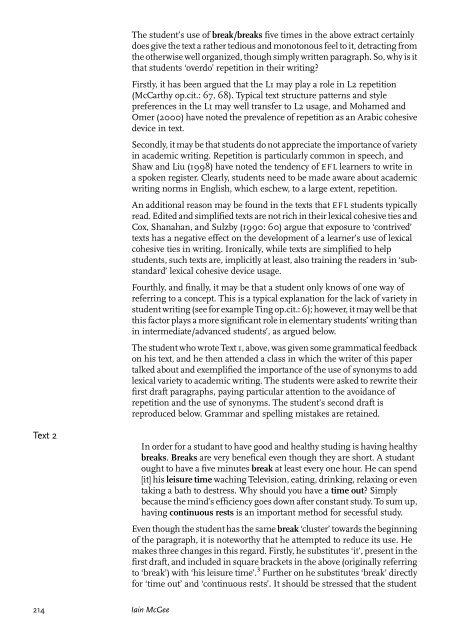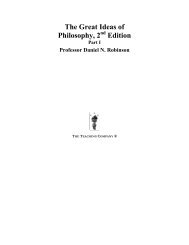Traversing the lexical cohesion minefield
Traversing the lexical cohesion minefield
Traversing the lexical cohesion minefield
Create successful ePaper yourself
Turn your PDF publications into a flip-book with our unique Google optimized e-Paper software.
The student’s use of break/breaks five times in <strong>the</strong> above extract certainlydoes give <strong>the</strong> text a ra<strong>the</strong>r tedious and monotonous feel to it, detracting from<strong>the</strong> o<strong>the</strong>rwise well organized, though simply written paragraph. So, why is itthat students ‘overdo’ repetition in <strong>the</strong>ir writing?Firstly, it has been argued that <strong>the</strong> L1 may play a role in L2 repetition(McCarthy op.cit.: 67, 68). Typical text structure patterns and stylepreferences in <strong>the</strong> L1 may well transfer to L2 usage, and Mohamed andOmer (2000) have noted <strong>the</strong> prevalence of repetition as an Arabic cohesivedevice in text.Secondly, it may be that students do not appreciate <strong>the</strong> importance of varietyin academic writing. Repetition is particularly common in speech, andShaw and Liu (1998) have noted <strong>the</strong> tendency of EFL learners to write ina spoken register. Clearly, students need to be made aware about academicwriting norms in English, which eschew, to a large extent, repetition.An additional reason may be found in <strong>the</strong> texts that EFL students typicallyread. Edited and simplified texts are not rich in <strong>the</strong>ir <strong>lexical</strong> cohesive ties andCox, Shanahan, and Sulzby (1990: 60) argue that exposure to ‘contrived’texts has a negative effect on <strong>the</strong> development of a learner’s use of <strong>lexical</strong>cohesive ties in writing. Ironically, while texts are simplified to helpstudents, such texts are, implicitly at least, also training <strong>the</strong> readers in ‘substandard’<strong>lexical</strong> cohesive device usage.Fourthly, and finally, it may be that a student only knows of one way ofreferring to a concept. This is a typical explanation for <strong>the</strong> lack of variety instudent writing (see for example Ting op.cit.: 6); however, it may well be thatthis factor plays a more significant role in elementary students’ writing thanin intermediate/advanced students’, as argued below.The student who wrote Text 1, above, was given some grammatical feedbackon his text, and he <strong>the</strong>n attended a class in which <strong>the</strong> writer of this papertalked about and exemplified <strong>the</strong> importance of <strong>the</strong> use of synonyms to add<strong>lexical</strong> variety to academic writing. The students were asked to rewrite <strong>the</strong>irfirst draft paragraphs, paying particular attention to <strong>the</strong> avoidance ofrepetition and <strong>the</strong> use of synonyms. The student’s second draft isreproduced below. Grammar and spelling mistakes are retained.Text 2In order for a studant to have good and healthy studing is having healthybreaks. Breaks are very benefical even though <strong>the</strong>y are short. A studantought to have a five minutes break at least every one hour. He can spend[it] his leisure time waching Television, eating, drinking, relaxing or eventaking a bath to destress. Why should you have a time out? Simplybecause <strong>the</strong> mind’s efficiency goes down after constant study. To sum up,having continuous rests is an important method for secessful study.Even though <strong>the</strong> student has <strong>the</strong> same break ‘cluster’ towards <strong>the</strong> beginningof <strong>the</strong> paragraph, it is noteworthy that he attempted to reduce its use. Hemakes three changes in this regard. Firstly, he substitutes ‘it’, present in <strong>the</strong>first draft, and included in square brackets in <strong>the</strong> above (originally referringto ‘break’) with ‘his leisure time’. 3 Fur<strong>the</strong>r on he substitutes ‘break’ directlyfor ‘time out’ and ‘continuous rests’. It should be stressed that <strong>the</strong> student214 Iain McGee














